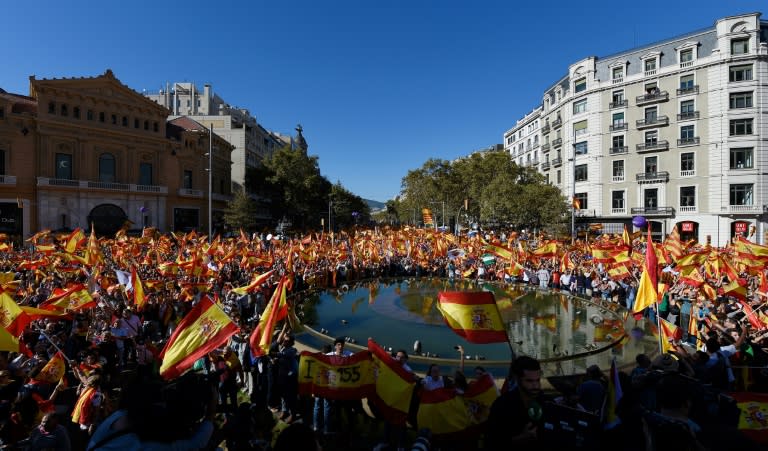Pride in being Spanish reborn in Catalonia
Francisco Alfonso had never voted or taken part in a demonstration before, but that all changed when Catalonia's leaders tried to break the wealthy northeastern region away from Spain. "Before, you kept quiet, you didn't say anything," said the 37-year-old plumber, a pro-unity supporter from the working-class town of Santa Coloma de Gramenet near Barcelona. But after Catalonia's separatist government went ahead with a banned independence referendum on October 1, and the region's parliament declared independence three weeks later, "you realise you have to hit the streets", he said. "If we didn't, this would be a jungle. They are separating us from Spain, companies are leaving, the economy is going downhill," he added, in a reference to the over 3,000 firms that have moved their legal headquarters away since the vote. For years, separatists monopolised attention -- red and yellow striped independence flags draped balconies and flew above dozens of town halls, while Spanish flags were scarce. Meanwhile, grassroots independence groups staged massive rallies. But the regional government's separatist drive has led many Catalan opponents of independence, like Alfonso, to become more vocal about their pride in being Spanish. Those feelings have intensified as Catalonia prepares to vote on Thursday in a regional election that could chart the course of Spain's secession crisis. After the referendum, pro-unity supporters began to hang Spanish flags across Catalonia and staged their own mass demonstrations, including one in Barcelona on October 8 that drew hundreds of thousands of people. "Never in my life had I owned a Spanish flag," said Alfonso's friend Mara Jose Gonzalez, a 63-year-old housewife who bought one for a rally. "The first day I used it I was afraid, but the second time I felt a sort of liberation," she added before heading to a campaign rally for pro-unity party Ciudadanos with her husband and Alfonso. - 'Vote clearly' - Set up in 2006 to fight Catalan nationalism, Ciudadanos has grown from a minor party into a front-runner which tops opinion polls ahead of Thursday's election. At campaign rallies supporters bear signs featuring a heart made up of the flags of Spain, Catalonia and the European Union. Turnout is expected to be high for the knife-edge election -- especially in traditionally anti-separatist areas where people do not usually participate in regional politics. "Voting for Ciudadanos is voting clearly. It is voting for union unreservedly," the leader of Ciudadanos in Catalonia, Ines Arrimadas, told reporters recently. Originally from Jerez de la Frontera in the southwestern region of Andalusia, Arrimadas speaks perfect Catalan and is married to a former nationalist Catalan lawmaker, making her a perfect symbol of the diversity that makes up the region's society in the eyes of many voters. "She is the one who represents me best," said Ana Maria Gonzalez, 73, after taking a picture with Arrimidas in Figueras, the birthplace of surrealist artist Salvador Dali in northern Catalonia. - 'So much scorn hurts' - Gonzalez was born in Seville, the capital of Andalusia, but moved to Figueras when she was 20, part of a vast influx of migrants from poorer regions of Spain to Catalonia. "They have always treated us well, I got along well with everyone but these last few months we have had a hard time," she said, her eyes welling with tears. Supporters of Catalan independence "attack you because you don't speak Catalan or for wearing this," she added, pointing to a lapel pin on her jacket with the Ciudadanos logo. "I am just as Catalan as them. I have worked my entire life here. We also helped build all of this. Up until now we did not say anything but we are tired of being attacked and insulted." A former president of the Catalan regional parliament said Arrimadas should return to Andalusia while a top Catalan author described migrants who have moved to Catalonia as "colonisers" in an opinion article. "So much scorn hurts," said Gonzalez. Ricardo Brau, a 17-year-old student, listened as he is called "facha", or fascist, in the centre of Barcelona because he was carrying a Spanish flag. "My family is Catalan, I am Catalan, but I also feel Spanish and I am proud to be so. I am tired of hiding it. But here, if you are not separatist, it seems like you are no longer Catalan," he said. Before he finished talking, a man wearing a safety pin calling for the release of Catalan leaders jailed for rebellion and other crimes over their separatist drive bumped into him. "See? This is what riles me up. And then we are the ones who are not democratic," he said.




